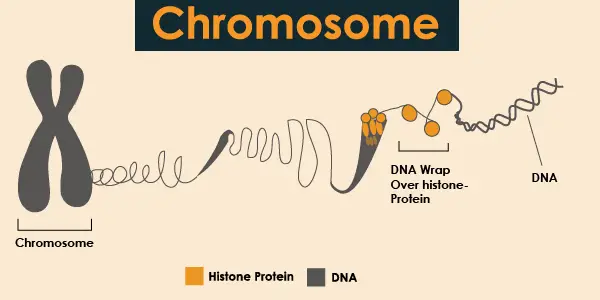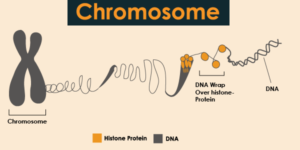
What is a Chromosome
A chromosome is a term derived from the Greek word which means Colored Body. It is a microscopic particle with a large filamentous form. It forms an organized structural package in the form of an X-shaped consisting of the nucleic acid (DNA). The DNA strand supercoils over histone to make chromosome.

- Chromosomes were first discovered by a Swiss scientist named Carl Welham in 1842. Later it was called a chromosome by Valdher Hartz, a reference from him to the susceptibility of these highly colored bodies to certain dyes.
- The DNA is present in the cell as a network of coherent lines. When the cell division process begins, the filaments of the network accumulate in the nucleus as lines of varying lengths and shapes known as a chromosome.
- The numbers of chromosomes differ in the cells of living things. They differ in humans from monkeys, elephants, and butterflies.
- A human cell possesses a total of 46 chromosomes that are residing in the cell in the forms of 23 pairs. The numbers of chromosomes are not related to the size of the organism. Elephants have 56 chromosomes in each cell, while 380 chromosomes are in the cells of the butterfly.
- To facilitate the process of studying chromosomes, the nucleus is depicted during division, and the chromosomes are arranged according to their length and shape into groups.
- Chromosome lengths are up to meters, but the protein and protein-assisted wrapping process reduce the size to nearly 8,000 times.
- The process by which chromosomes are arranged or organized is called karyotyping.
Functions of Chromosome:
Functions of chromosome: It shows details of the human, as any person has 46 chromosomes, so they are in pairs & there are 23 pairs, & these pairs are numbered from 1-22, but the 23rd pair isn’t given a number because it is the sex-specific pair Thus, a person has half chromosomes from mother & half from father.
Let us go through some other important functions of chromosomes and that are listed below:
- Chromosomes are responsible for determining details of a person’s composition, such as eye color, skin and hair, and small body composition.
- The chromosomes are responsible for determining the gender of the newborn, as the chromosomes are denoted by the letters Y and X, and this is determined by the gender of the newborn.
- Chromosomes have a role in determining the incidence of certain diseases such as Down Syndrome and Werner Syndrome.
- Chromosomes are responsible for determining intelligence, fear, anxiety, and cowardice.
- It has a function in determining the functions of the body’s growth, and in identifying traits.
Following are some more functions with chromosome numbers:
- Chromosome #1: It plays a role in appetite and nerve growth.
- Chromosome #2: Relates to diseases such as bowel cancer and difficulty learning.
- Chromosome #4: has a role in the teeth and their early fall.
- Chr #5: Managing your sense of stress and calm.
- Chr #6: This chromosome relates to fertility, feelings and milk production in infants.
- Chr #7: Regulates red blood cell production and keeps skin soft.
- Chr #8: It is related to hair loss and baldness.
- Chr #9: It has to do with blood type determination and nose odor understanding.
- Chr #10: It has to do with excessive appetite and thus obesity.
- Chr #11: has a role in determining personality, and it also plays an important role in developing tumors, also protecting teeth from caries.
- Chr #12: Its role is to determine intelligence and body length or shortness as well, related to alcohol allergy.
- Chr #13: Has a role in autism and breast cancer.
- Chr #14: It is related to human deafness and Alzheimer’s disease.
- Chr #17: It has to do with feelings of fear and physical strength.